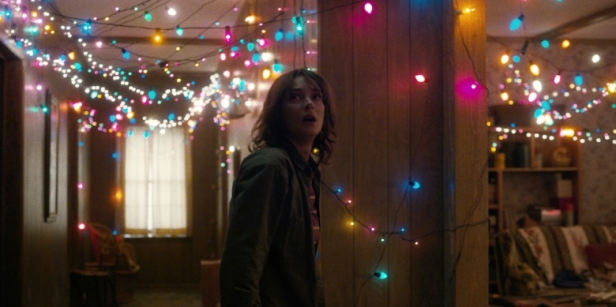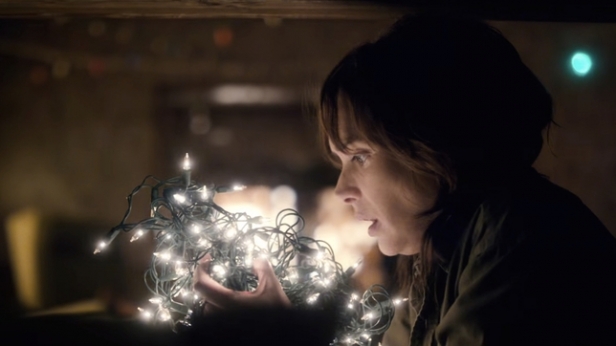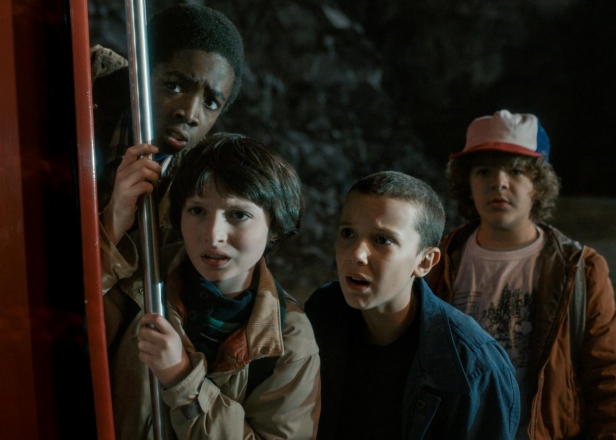It can feel sensible to be wary of things that lean too heavily on nostalgia. From the opening minutes of Stranger Things, it’s obvious that creators Matt and Ross Duffer want to put you in mind of ET, Halloween, A Nightmare On Elm Street and, most of all, Stephen King’s It. For this writer and, judging by the reaction so far, many, many Netflix viewers, these are incredibly powerful and important cultural touchstones, and the rush of goodwill we felt during the first couple of episodes was tempered with one real concern: Can Stranger Things offer the viewer more than warm and fuzzy creepy memories?
Happily, the answer is: Yes. Netflix’s new supernatural horror series is one of the service’s best original series yet, and their first true success story for fans of things that go bump in the night. The Duffers don’t only understand that we love those classics, they understand what makes them great. So while they are constantly riffing and cribbing, they’ve done so with love, they’ve been very clever about it, and they’ve made something that works beautifully.
The show kicks off with young Will Byers (Noah Schnapp) going missing after returning home from a D&D game with his friends Mike (Finn Wolfhard), Lucas (Caleb McLaughlin) and Dustin (Gaten Matarazzo). Burnt-out Chief Hopper (David Harbour) tries to reassure his mother Joyce (Winona Ryder) that there’s going to be a perfectly logical explanation, but we know better. There’s a monster on the loose, something that got out of a government lab, and somehow young fellow escapee Eleven (Millie Bobby Brown) is connected to it.
Joyce frantically tries to connect with her missing son through fairy lights and a makeshift Ouija board while his friends race to uncover the unbelievable truth about what happened, but can they stay ahead of the government forces and that ravenous creature?
It’s honestly difficult to overstate the nostalgia that Stranger Things conjures up, and we’re going to try to stop using that word now, but the real triumph of the show is in the fact that, at a certain point, it stops feeling like something that’s a lot like an ‘80s classic, and feels like an ‘80s classic. The Duffers, who also directed the bulk of the series (Shawn Levy helms two episodes), expertly create a vivid sense of time and place, but not at the expense of their story or characters.
Each of the three key age groups are well written and perfectly cast. There’s Mike’s plucky band of outsiders (heavily reminiscent of It’s Losers’ Club, even collectively referred to as “losers”), who, with their Star Wars references and Amblin bicycles, are closer to the truth than anyone else thanks to the mysterious and super-powered Eleven. There’s Mike’s teenage sister Nancy (Natalia Dyer), whose budding relationship with arrogant jock Steve (Joe Keery) is put on hold as she is pulled into the monster hunt along with Will’s outcast brother Jonathan (Charlie Heaton). And then there’s Joyce and Hopper, two adults whose difficult personal lives suddenly take a back seat as their eyes are opened. From Ryder and Harbour to the kids, there’s not a single bad performance here.
Their journeys, which gradually intertwine over the course of the eight episodes, are frequently creepy, often full-blown scary (that “RUN” message is fantastic), but they’re affecting too. These are lessons obviously learned from King: the horror hits harder when you like the characters, and we’re rooting for all of them. When they’re hurt or killed, it’s a shock.
It helps that the season’s relatively short eight-episode structure (as opposed to Netflix dramas’ standard 13) allows the Duffers to keep the tension levels high. We’re never allowed to forget that something terrible is out there, whether that’s the monster, Matthew Modine’s sinister agency goons, or school bullies with a grudge, and the mid-to-late season slump that several Netflix dramas have been guilty of never comes into play.
 There’s also a real sense of ambition in the sci-fi element of the show. The writers keep a firm grip on their cross-dimensional plotting (thanks to regular exposition from scene-stealing amiable science and AV club teacher Mr Clarke (Randall P Havens)), and bring their otherworldly terrors to life with great skill. Eleven’s journeys into the unknown are tense and unnerving, and there’s some impressively nightmarish imagery in the dark.
There’s also a real sense of ambition in the sci-fi element of the show. The writers keep a firm grip on their cross-dimensional plotting (thanks to regular exposition from scene-stealing amiable science and AV club teacher Mr Clarke (Randall P Havens)), and bring their otherworldly terrors to life with great skill. Eleven’s journeys into the unknown are tense and unnerving, and there’s some impressively nightmarish imagery in the dark.
Although it does inevitably build to an action-packed finale, Stranger Things is at its best when it focuses on the personal. The look on Joyce’s face as that ball of Christmas lights suddenly starts glowing, the kids striving to stick together in spite of everything, Nancy realising what might have happened to her missing friend…these characters connect with us and push the show beyond well-intentioned homage into something special.
Stranger Things combines that Spielberg sense of wonder with King’s relatable characters and fear of the dark and puts John Carpenter synths on top, and it marks the Duffers as exciting talents. This is compulsive viewing: scary, atmospheric, heartfelt, and for 80s genre fans, it’s a lot like uncovering a lost classic. Close the curtains, turn out the lights, and settle in for a treat.
Stranger Things is now streaming on Netflix. Read our interview with the creators here and keep up with the latest news with the new issue of SciFiNow.

